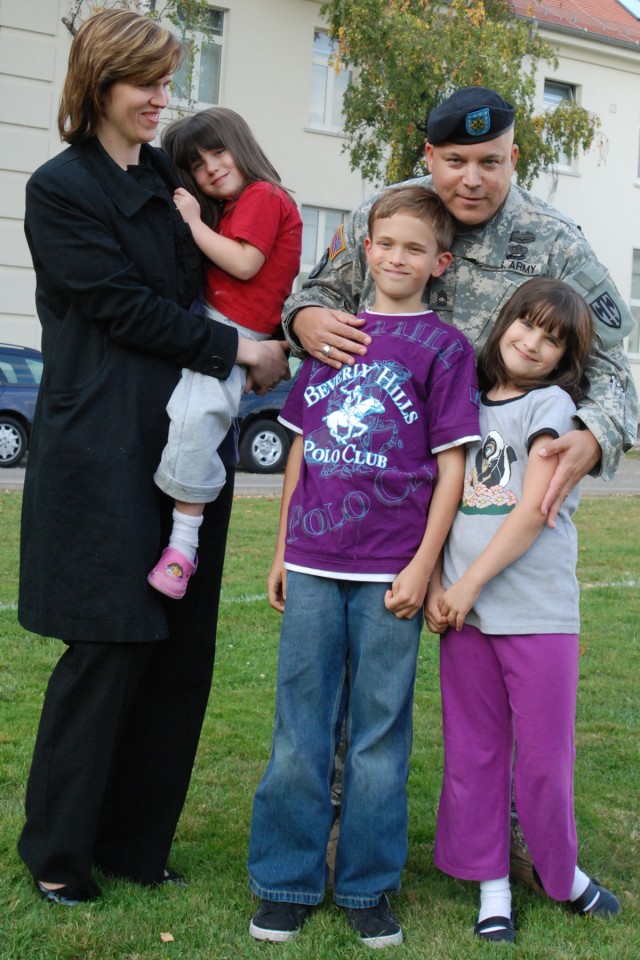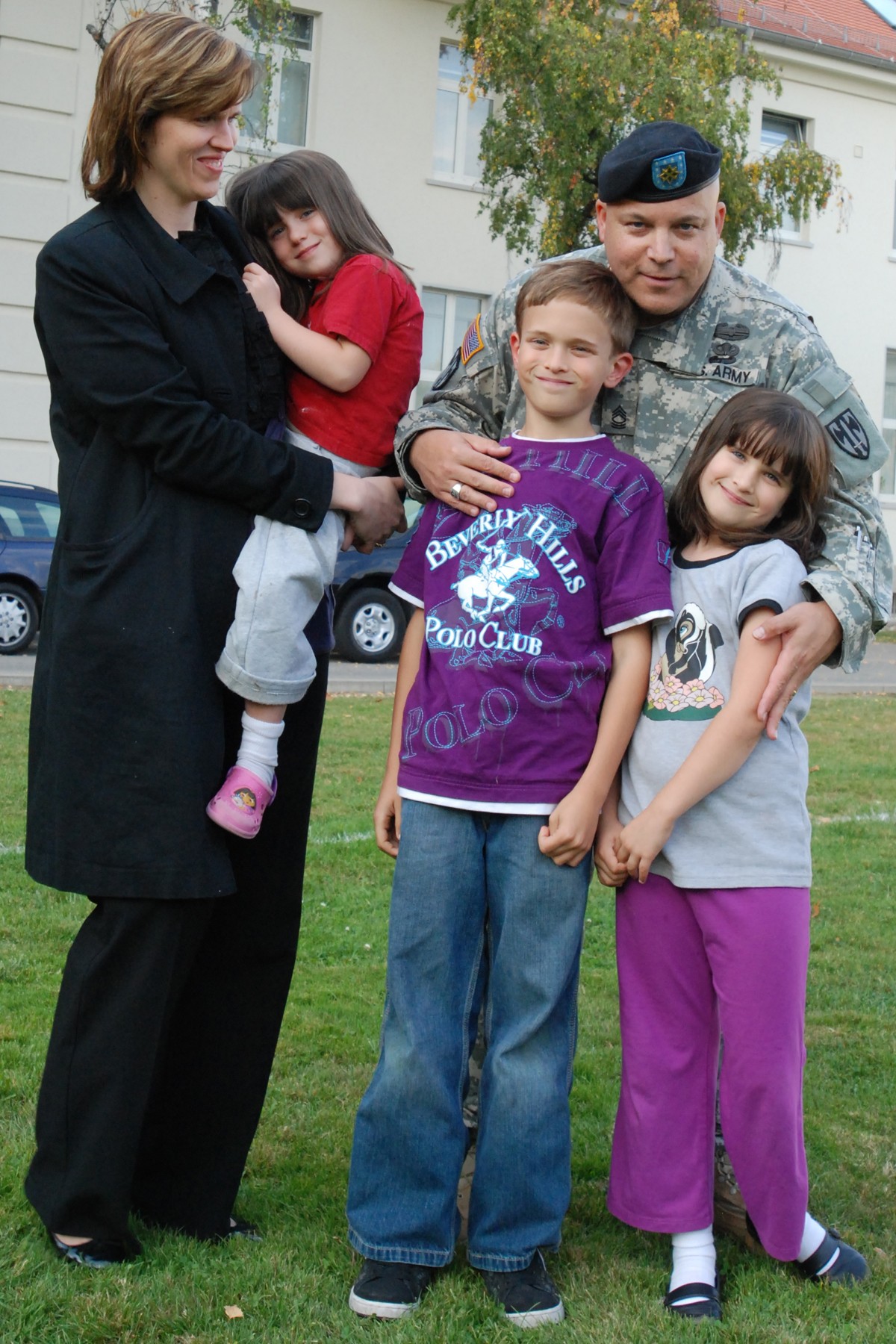STUTTGART, Germany -- If deployment is a tunnel, deployed service members are the train. Like a car on a track, they focus on their mission at hand to get through the days away from home. However, when the tunnel is behind them, service members often struggle to slow the train down without derailing.
For a majority of service members, the hardship of deployment occurs mainly when they return home, instead of during the deployment, according to Dr. Eric N. Leong, chief of behavioral health for the Stuttgart Army Health Clinic.
During the "reintegration phase" of deployment, service members are forced to "do a 180" by living in the civilian world again and re-joining family life. At this point, they see differences in their home, family and even in themselves.
How service members deal with these changes can make the difference between a healthy transition and a train wreck.
BACK FROM THE BATTLEFIELD
Today's technology allows service members to take a flight directly home from the war zone, compared to years past, when they might have had months on a ship before they saw their families.
This can prevent them from taking time to unwind, said Chaplain (Maj.) David Santiago Cruz, family life chaplain for U.S. Army Garrison Stuttgart.
"You're on the battlefield in Afghanistan," he said. "Twenty-four hours later, you're in downtown Stuttgart."
They may find it hard to be in a crowd without looking for threats, added Santiago.
For Master Sgt. Martel Herrera, operations noncommissioned officer in charge for the 554th Military Police Company in Stuttgart, this was especially true.
While he was deployed to Iraq for 15 months, Herrera had to be constantly looking for possible improvised explosive devices along the roads. "There's major anxiety when you're driving," he said. "When I came back, it was an adjustment."
Herrera said going into the Post Exchange was hard, at first. "I stayed extremely alert [to] the different noises coming from different directions," he said. "It kinda made me tired and wore me out."
Herrera also experienced trouble sleeping. "I woke up three or four time a night," he said, and it took him five to six months to get completely used to living at home again.
"One of the most important things that I would recommend to any Soldier coming back would be acceptance [of this]: it's a possibility you can be affected when you come back," Herrera said. "Nobody is exempt from it ... no matter who you are and how many times you've deployed.
"Don't be afraid to see somebody, a doctor or a chaplain, if you are not adjusting well."
PART OF THE FAMILY AGAIN
In addition to the shock of an entirely different environment, the people and routines that a service member left behind will likely be different.
"One of the biggest problems is that we [service members] think that everything stops on the other side while we are gone. You need to understand that [the spouses] are not going to be the same people; they had a life while you were gone," Santiago said. "I felt more like a visitor when I came home."
A USAG Stuttgart Special Forces Soldier, who wished to remain anonymous and will be referred to as Scott in this article, said one of the biggest changes he had to get used to was the growth of his daughter.
"I was five months in Iraq," Scott said. "I left a baby. When I came back, I remember walking into her bedroom the night I came home. She was this little person. It was amazing to see her transformation."
With all of the growing and changing that takes place during deployments, family activities can provide the catalyst for bonding together.
When Herrera returned from Iraq, he scheduled special days to spend individually with each one of his children and his wife. "We try to do things on weekends together as a family," he added.
He also kept himself busy, so he wouldn't be overwhelmed with changes. He started coaching his kids in sports. "Just being around the kids got me through a lot of little issues," he said.
For service members who had a healthy relationship with their spouse before they deployed, bonding again can be as easy as spending time together.
However, the process can be difficult if there were unresolved issues in the marriage before the deployment, Santiago said.
"Sometimes they come back and find the homecoming is not as expected," he added. "There are issues in the relationship."
The key to keeping a marriage strong through a deployment is to always work on it, Santiago added. "If you put some work in and you have a strong relationship before you deploy, I'm almost positive that you can come back and have a relationship."
THE NEW ROUTINE
During deployments, military spouses and children develop new routines and ways to manage the household.
When service members return, they have two choices in this situation, Herrera said. "You can be a lazy fish and lay on the couch or you can get involved."
However, joining in is not the same as taking over. While it may be tempting to try and change everything back to the way it was before the deployment, Santiago said, the new methods may be better.
"If something is working, don't change it," Santiago said. He used to do the finances, but his wife took over when he deployed. "She was doing it better than me."
In the end, he added, the focus should be on the present, not how things ran during the deployment.
"The key for success is, instead of paying attention to what [the spouse] did wrong or what you can change, focus more on showing appreciation - that you are really glad to be back and that you appreciate the opportunity to be together again," he said.
PROCESSING THE WAR ZONE
Depending on the job of the service member down range, they may return from a deployment with issues related to some of the images they saw.
Sometimes service members will not talk about their experiences in war with their families, said Leong, the USAG Stuttgart behavioral health chief. "They have a hard time sharing with their kids and spouse. The horror of war doesn't make sense."
Some service members develop symptoms, including the inability to sleep, irritability, flashbacks and nightmares.
In fact, 75 percent of Soldiers returning from a deployment have sleep-related issues, Leong added.
"A lot of times they come back having to deal with remembering things," said Tracy Herrera, USAG Stuttgart substance abuse counselor (and Martel Herrera's wife). Sometimes, "they try to deal with symptoms themselves by turning to alcohol, which never works."
Instead of using alcohol, Herrera suggests talking to a battle buddy and seeking professional help.
"People need to understand that these guys are seeing things that a normal person on the street will never have to see," she said. "Of course they're going to react. It doesn't mean that they're damaged. It just means that they need help in being able to process those things."
A FEW FACTS ON PTSD
Many families worry that their spouse or parent will return from a deployment with post-traumatic stress disorder.
However, a relatively low percentage actually do, said Leong, the behavioral health doctor. In fact, the likelihood of having PTSD is only 30 percent for service members involved in intense daily combat.
When a service member does have PTSD, or some of its symptoms, it is important for families to support them by being patient and involve them, Leong said."Sometimes seeing movies together or doing sports together can be a very healing kind of thing."
Leong also stressed the importance of seeking professional help from a mental health counselor, even though it is often viewed as something for the weak.
"It's strong to get help," he said.
Editor's Note: This is the final installment in a three-part series addressing the emotional affects deployment has on families in the military.


Social Sharing